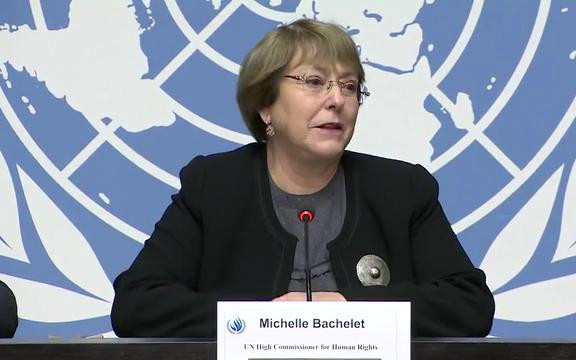18 April 2019 – The United Nations Office of the High Commissioner (OHCHR) today issued a statement expressing “alarm at the court decision in Bahrain that revoked the nationalities of 138 people after a mass trial” and raising concern that “the court proceedings failed to comply with international fair trial standards.” With this verdict, the number of Bahrainis who have had their citizenship revoked has risen to 990 since 2012.
On 16 April 2019, Bahrain’s Fourth High Criminal Court issued the final verdict in a mass trial of 169 defendants, acquitting 30 defendants, revoking the citizenship of 138 individuals, and sentencing 139 to between three years in prison and life in prison. The government had accused the defendants, 17 of whom are believed to be minors between the ages of 15 and 17, of being part of a terrorist cell and had sentenced them under the kingdom’s vague and broad counter-terror law.
In response, High Commissioner Bachelet highlighted that “the UN Human Rights Office has long urged Bahrain to bring its overly broad counter-terrorism and counter-extremism legislation in line with its international human rights obligations.” She likewise expressed concerns about the sentencing procedure, stating “Tuesday’s convictions give rise to serious concerns about the application of the law, particularly through a mass trial that reportedly lacked the procedural safeguards necessary to ensure a fair trial.”
The Office of the High Commissioner has previously raised concerns about Bahrain, including in January 2019 when OHCHR called on the Bahraini government to “immediately and unconditionally release prominent human rights defender Nabeel Rajab” after he his five-year prison sentence on free expression charges had been upheld. The mandates of the Special Procedures have also raised concerns about Bahrain including in April 2018, when several mandate holders expressed alarm over Bahrain’s use of capital punishment after a court sentenced four men to death in unfair trials and after credible allegations of torture. Although their sentences were commuted to life in prison, the experts stated that “they should never have been convicted on the basis of flawed trials.” In June 2017, a group of Special Rapporteurs called on Bahrain to end its “orchestrated crackdown on civil society,” and highlighted the kingdom’s use of its overly broad and vague counter-terror law to target dissidents.
These past concerns surrounding unfair trials – including mass trials – and the use of counter-terror legislation are raised in the High Commissioner’s recent statement, but also appear to be fixations in Bahrain’s criminal justice system:
- On 31 January 2018, Bahrain’s Fourth High Criminal Court convicted 58 of 60 defendants, revoking the citizenship of 47 of those convicted and sentencing two of the defendants to death.
- On 1 February, the same court convicted 26 of 32 defendants, sentencing one to the death penalty and revoking the citizenship of 25 defendants.
- On 15 May 2018, the Fourth High Criminal Court convicted 115 of 132 defendants, sentencing 53 of the individuals to life in prison and revoking the nationality of all those convicted. ADHRB has represented 20 individuals in this case who reported torture and fair trial rights violations.
- On 27 February 2019 the High Criminal Court convicted 167 of 171 defendants who had been arrested during a peaceful sit-in in Duraz, sentencing them to between one and ten years in prison. This is reported to be the largest conviction in one case in Bahraini history.
Americans for Democracy & Human Rights in Bahrain (ADHRB) welcomes the strong statement by the High Commissioner for Human Rights. We urge the Government of Bahrain to release all those who have been imprisoned following flawed trials and to reinstate the nationality of the defendants who have had theirs revoked. We additionally urge Bahrain to bring its domestic laws in line with international human rights standards and to amend and narrow its counter-terror law.





